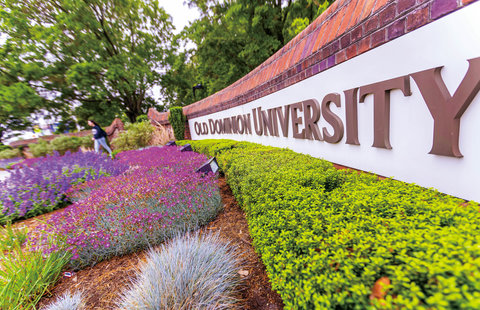The interdisciplinary minor in Sustainability & Conservation Leadership focuses on conservation and sustainability issues in the context of a modern society embedded and depending on a changing planet. Offered by ODU in collaboration with the U.S. Fish and Wildlife Service (USFWS), the minor facilitates the development of the next generation of professionals who can address conservation and sustainability issues and challenges posed by a changing climate and sea level rise.
Program Highlights
-
One of the three core courses is a mentored internship, preferably at a facility of a federal or state agency
-
One course (3 credit hours) is designated as a service-learning course in which the student will be engaged in a project at a USFWS (or related) facility
-
All mandatory courses are built on learning by experience in research of real-world wicked problems
-
Open to students from all programs, as we aim for a highly diverse set of academic disciplines within the student population
Featured Courses
Careers
Check out these ideas from ODU's Center for Career & Leadership Development and the Occupational Information Network (O*NET). A median salary is a midpoint of what people typically earn—half of those surveyed earned above the median salary, and half earned below.
Conduct economic analysis related to environmental protection and use of the natural environment, such as water, air, land, and renewable energy resources. Evaluate and quantify benefits, costs, incentives, and impacts of alternative options using economic principles and statistical techniques.
Manage, improve, and protect natural resources to maximize their use without damaging the environment. May conduct soil surveys and develop plans to eliminate soil erosion or to protect rangelands. May instruct farmers, agricultural production managers, or ranchers in best ways to use crop rotation, contour plowing, or terracing to conserve soil and water; in the number and kind of livestock and forage plants best suited to particular ranges; and in range and farm improvements, such as fencing and reservoirs for stock watering.
Address organizational sustainability issues, such as waste stream management, green building practices, and green procurement plans.
Communicate and coordinate with management, shareholders, customers, and employees to address sustainability issues. Enact or oversee a corporate sustainability strategy.
Requirements
Transfer
At ODU, we understand that as a transfer student you have unique needs that require a wide array of campus resources. The Center for Advising Administration and Academic Partnerships aims to create a transfer inclusive culture that supports the successful...
Cost
Estimated rates for the 2025-26 academic year. Rates are subject to change. Other fees are assessed for special services and certain academic programs. Anyone that is not a current Virginia resident will be charged non-resident rates. That includes international students.
Ways to Save
Here are a few ways for you to save on the cost of attending ODU. For more information visit University Student Financial Aid.
Contact








